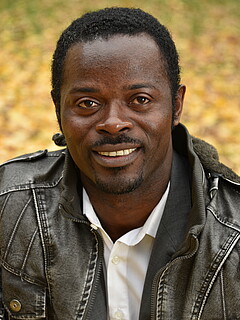PhD students 2nd cohort

Dr. des. Pascal Ongossi Assamba
Friedrich-Schiller-University Jena
Research Training Group "The Romantic Model"
pascal.ongossi.assamba@uni-jena.de
Curriculum Vitae
Pascal Ongossi Assamba (born 1979) studied German language and literature at the University of Yaoundé 1 from 2000 till 2005. He later completed a dual-stage Diploma in marketing and company management in 2006. With his “Licence” Bachelor he then completed a dual-stage teacher training course for secondary school education at the teacher training college in Yaoundé. He has been working as a secondary school German language teacher since 2009 and as an assistant lecturer since 2017.
In 2010 he defended his Magister thesis at the faculty of African literature and civilisation in the University of Yaoundé 1. He later defended his master’s thesis in 2014 where he explored questions on interculturality, identity and representation in the post-colonial era.
PhD project
ROMANTICISM – COLONIALISATION – NATION BUILDING
BASED ON HERANN SKOLASTER’S “KRIEG IM BUSCH”; THEODOR SEITZ’S “VOM AUFSTIEG UND NIEDERBRUCH DEUTSCHER KOLONIALMACHT” AND THE WORK OF JEAN IKELLE-MATIBA
The question that lies at the heart of this project is: what was the influence and significance of Romanticism in the cultural encountering of the Other.
The project shall examine:
- How did German Romanticism present and assert itself? To what extent can the first German arrivals be classified as Romantics and how did this express itself in their encounters with this African country?
- How did the Germans perceive this tropical country and how did they see themselves?
- How were the indigenous people educated about the Romantic relationship to nature, self-awareness, the German past and the Romantic world view/ideology, and how did they apprehend it?
The objective of this project is to analyse the German colonisation of Cameroon from 1884 to 1914 and to examine the cultural consequences of the German presence in this tropical region.
The first stage of the analysis will refer to the works of German explorers, “discoverers” and researchers of this country. Their efforts, which sound more romantic than scientific can be considered as the impulse behind the German craving for Africa.
The German arrivals, born and raised in environments steeped in German romanticism, built schools, churches and colonial administrative units with which the “to-be-civilised” or “uncivilised” indigenous would learn the German language as well as the German value system, German culture and acquire the initial ideas of what it means to be a nation.
In this respect, it will be interesting to examine how the German romanticism that was taught at that time was disseminated in the thoughts, philosophy and literature of German-educated Cameroonians and their successors.